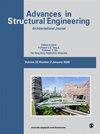高速冲击条件下铝木夹层结构渐进式损坏的非线性分析模型
IF 2
4区 工程技术
引用次数: 0
摘要
实验研究了由 2A12 铝合金和木质层压板组成的各种防护结构的冲击响应。实验采用了不同的冲击能量。通过改变夹层材料厚度和使用两种不同形状的子弹,研究了夹层材料的破坏过程和核心层厚度对防护性能的影响。使用改进的三维哈辛准则确定了多层结构芯层的破坏条件,并使用 Abaqus 软件建立了有限元模型。进行了拉伸和三点弯曲试验,并对渐进破坏模型进行了静态验证。然后使用霍普金森棒试验对模型进行了动态验证。通过在不同加载速率下对试样进行动作加载测试,获得了材料在高动态应变速率下的机械性能。分析了加载波形,并绘制了不同应变速率下的应力-应变关系图。通过验证实验数据,建立了能够捕捉破碎过程中变形和破坏细节的数值模型,并描述了复合靶板冲击破坏模式和轨迹变化规律。这项研究可为层压板的冲击破坏预测提供一种新方法。本文章由计算机程序翻译,如有差异,请以英文原文为准。
Nonlinear analysis model of the progressive damage of aluminum–wood sandwich structures under high-speed impact conditions
The impact responses of various protective structures composed of 2A12 aluminum alloy and wood laminates were studied experimentally. The experiments were conducted using different impact energies. By varying the sandwich material thickness and using two different bullet shapes, the effects of the sandwich material’s damage process and the core layer thickness on the protective performance were studied. The multilayer structure’s core layer failure condition was determined using the improved 3D Hashin criterion and a finite element model was established using Abaqus software. Tensile and three-point bending tests were conducted and the progressive damage model was verified statically. The model was then verified dynamically using the Hopkinson bar test. The mechanical properties of the materials under high dynamic strain rates were obtained through action loading testing of the specimens at different loading rates. The loading waveform was analyzed and a stress-strain relationship diagram was drawn at various strain rates. By verifying the experimental data, a numerical model that could capture the deformation and failure details during crushing was established, and the composite target plate impact failure mode and the trajectory change law were described. This study could lead to use of a new impact damage prediction method for laminates.
求助全文
通过发布文献求助,成功后即可免费获取论文全文。
去求助
来源期刊

Advances in Mechanical Engineering
Engineering-Mechanical Engineering
自引率
4.80%
发文量
353
期刊介绍:
Advances in Mechanical Engineering (AIME) is a JCR Ranked, peer-reviewed, open access journal which publishes a wide range of original research and review articles. The journal Editorial Board welcomes manuscripts in both fundamental and applied research areas, and encourages submissions which contribute novel and innovative insights to the field of mechanical engineering
 求助内容:
求助内容: 应助结果提醒方式:
应助结果提醒方式:


